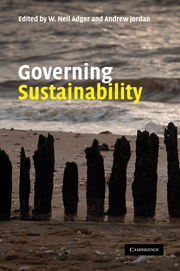Crossref Citations
This Book has been
cited by the following publications. This list is generated based on data provided by Crossref.
Adger, W. Neil
Lorenzoni, Irene
and
O'Brien, Karen L.
2001.
Adapting to Climate Change.
p.
1.
Jordan, Andrew
2009.
Revisiting … The Governance of Sustainable Development: Taking Stock and Looking Forwards.
Environment and Planning C: Government and Policy,
Vol. 27,
Issue. 5,
p.
762.
DE LA VEGA‐LEINERT, A. CRISTINA
STOLL‐KLEEMANN, SUSANNE
and
O'RIORDAN, TIM
2009.
Sustainability Science Partnerships in Concept and in Practice: a Guide to a New Curriculum from a European Perspective.
Geographical Research,
Vol. 47,
Issue. 4,
p.
351.
Jordan, Andrew
and
Lenschow, Andrea
2010.
Environmental policy integration: a state of the art review.
Environmental Policy and Governance,
Vol. 20,
Issue. 3,
p.
147.
Faram, M. G.
Ashley, R. M.
Chatfield, P. R.
and
Andoh, R. Y. G.
2010.
Appropriate drainage systems for a changing climate.
Proceedings of the Institution of Civil Engineers - Engineering Sustainability,
Vol. 163,
Issue. 2,
p.
107.
Hayward, Bronwyn
and
O'Brien, Karen
2010.
Climate Change, Ethics and Human Security.
p.
199.
STOLL-KLEEMANN, S.
DE LA VEGA-LEINERT, A. C.
and
SCHULTZ, L.
2010.
The role of community participation in the effectiveness of UNESCO Biosphere Reserve management: evidence and reflections from two parallel global surveys.
Environmental Conservation,
Vol. 37,
Issue. 3,
p.
227.
Griffin, Liza
2010.
Governance innovation for sustainability: exploring the tensions and dilemmas.
Environmental Policy and Governance,
Vol. 20,
Issue. 6,
p.
365.
Boyd, Emily
and
Folke, Carl
2011.
Adapting Institutions.
p.
264.
Cumming, Graeme S.
2011.
Spatial Resilience in Social-Ecological Systems.
p.
7.
Joss, Simon
2011.
Eco-City Governance: A Case Study of Treasure Island and Sonoma Mountain Village.
Journal of Environmental Policy & Planning,
Vol. 13,
Issue. 4,
p.
331.
Cumming, Graeme S.
2011.
Spatial Resilience in Social-Ecological Systems.
p.
231.
Cumming, Graeme S.
2011.
Spatial Resilience in Social-Ecological Systems.
p.
35.
ERIKSEN, SIRI
and
BROWN, KATRINA
2011.
Sustainable adaptation to climate change.
Climate and Development,
Vol. 3,
Issue. 1,
p.
3.
TACCONI, LUCA
2011.
Developing environmental governance research: the example of forest cover change studies.
Environmental Conservation,
Vol. 38,
Issue. 2,
p.
234.
Roberts, Jane
2011.
Video diaries: a tool to investigate sustainability-related learning in threshold spaces.
Environmental Education Research,
Vol. 17,
Issue. 5,
p.
675.
Kay, Adrian
and
Ackrill, Robert
2012.
Governing the transition to a biofuels economy in the US and EU: Accommodating value conflicts, implementing uncertainty.
Policy and Society,
Vol. 31,
Issue. 4,
p.
295.
Ashley, R.M.
Blanskby, J.
Newman, R.
Gersonius, B.
Poole, A.
Lindley, G.
Smith, S.
Ogden, S.
and
Nowell, R.
2012.
Learning and Action Alliances to build capacity for flood resilience.
Journal of Flood Risk Management,
Vol. 5,
Issue. 1,
p.
14.
Newell, Peter
Pattberg, Philipp
and
Schroeder, Heike
2012.
Multiactor Governance and the Environment.
Annual Review of Environment and Resources,
Vol. 37,
Issue. 1,
p.
365.
BRENNER, LUDGER
and
JOB, HUBERT
2012.
CHALLENGES TO ACTOR‐ORIENTED ENVIRONMENTAL GOVERNANCE: EXAMPLES FROM THREE MEXICAN BIOSPHERE RESERVES.
Tijdschrift voor Economische en Sociale Geografie,
Vol. 103,
Issue. 1,
p.
1.





